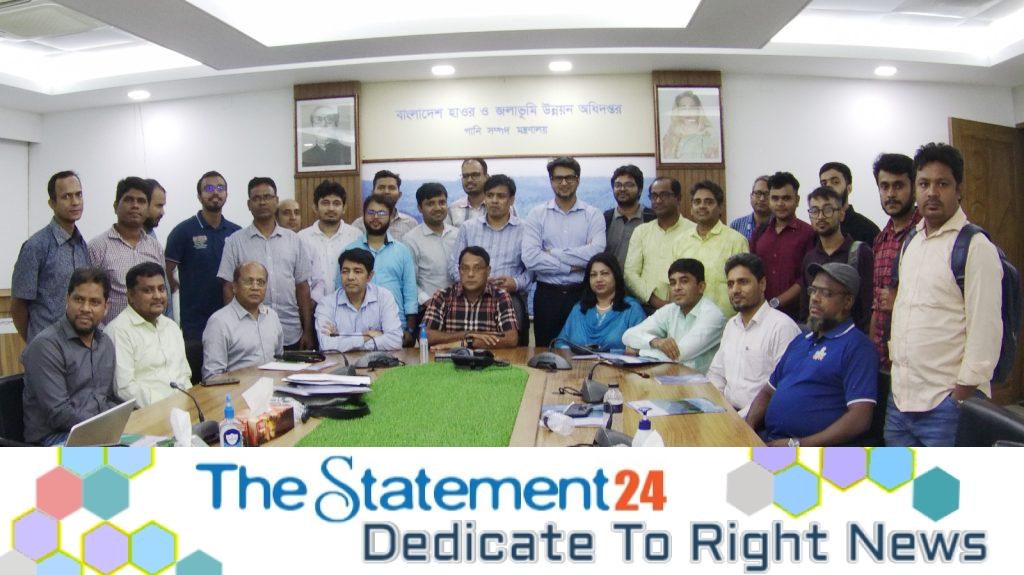
Speakers at a workshop have said that the Haor and wetlands of Bangladesh have immense potential for strengthening the country’s economy. If the Haor and wetlands of the country come under proper management and the resources of the reservoirs can be used properly, Bangladesh will advance economically. The country will move forward in many other ways. However, the prospects and problems of Haor and wetland should be covered in mass media properly for the way-out.
Delivering his presidential speech at the event, Md. Akhtaruzzaman, Director General (additional secretary) of the Department of Bangladesh Haor & Wetlands Development; said that the role of mass media and journalists is essential to exploit the immense potential of Haor and wetland. He called upon the media and journalists to play a vital role in conserving and developing the Haor and wetland by providing news items.
The department arranged the workshop titled ‘100 Years of Haor and Wetland’ at the conference room of the department at Panthapath in the capital on Sunday (09/06/2024). ‘Amra Nari’ and Marine Journalists’ Network-MJN were co-organisers of the event.
Md. Akhtaruzzaman presented the keynote paper at the workshop, while Ehsanul Haque Jasim, vice president of Marine Journalists’ Network-MJN; presented an article on ‘Role of Media in Conservation and Development of Haor’ at the event moderated by MM Zahidur Rahman Biplob, founder of ‘Amra Nari’.
Dr SM Tanvir Hasan, water resources expert of the Institute of Water Modeling (IWM); Raju Ahmad former general secretary of Dhaka Reporters Unity (DRU); Muhammad Anowarul Hoque, secretary general of ‘Save Our Sea’; Nasima Akhter Shoma of Bangladesh Post; Rashad Ahamad, president of Marine Journalists’ Network-MJN; and Kafayet Shakil, general secretary of the organization; took part in the discussion.
In his speech, Md. Akhtaruzzaman, DG of the Department of Bangladesh Haor & Wetlands Development; said that this department is working sincerely to conserve the Haor and wetlands of the country. Mass media can play a vital role in the conservation and development of the Haor and wetlands. He sought the cooperation from media and journalists in this regard.
“We cannot catch tuna fish. However, Japan is catching this fish from our sea and reservoirs and processing it on the ship and marketing it,” he said during presenting his keynote paper.
He believes that sediment and siltation are the major problem in the Haor and wetlands at present. At least one billion metric tons of sediment falls every year. As a result, rivers and wetlands of the country are filling up.
He said that 71 per cent of the country’s GDP can come from the export of freshwater fish. Three times more profit in fish farming than rice can be possible if plan is taken properly and it is implemented.
Citing the example of Ratargul Swamp Forest in Sylhet, Md. Akhtaruzzaman said that there are about 100 crore trees in Ratargul. Fish are sheltering at the base of these trees. Birds take shelter in trees. This model of Ratargul can be used in Haor and other wetlands of the country. It will also improve the environment.
Referring to global warming, he said that Jashore, Noakhali and Barishal regions will sink if the global temperature increases by 4 degrees. If Haor and wetlands are preserved properly, it will play a vital role in temperature control.
In his article, Ehsanul Haque Jasim said that except seven districts of Bangladesh and some areas of India, there is no Haor anywhere else in the world. Haor area is one of the country’s main economic production areas, it generates 17% of rice production, while 20% of total inland fish output. Haor regions’ gas, mineral deposits, biodiversity, wetland, tourism, and other economic activities are all significant. Haor districts generate 90% of the country’s overall gas output, he added.
He said, Haor is being degraded rapidly due to various unplanned projects and development activities of the government. The Haor area faces challenges in education, poverty, child labour, clean water, sanitation facilities, malnutrition, lack of health facilities, connectivity and natural disasters. Flash flooding occur regularly, which affect the northeastern part of the country adversely. Many people die every year due to lightning. However, these are not covered by media properly, he added.
He further said the flow of Haor water is obstructed due to All-Weather Road in Kisherganj. This is one of the reasons behind 2022 floods.
Claiming that 100 people died in that flood, Ehsanul Haque Jasim said that this information did not come to the media. He emphasized on bringing the news of Haor properly to the media.
Muhammad Anowarul Hoque said that the Water Development Board only constructs dams for water development projects. Ground water is being wasted by cultivating fish on the roof. It also spoils the quality of fish. There is no need for rooftop fish farming if Haor and reservoirs of the country are properly conserved and managed.

